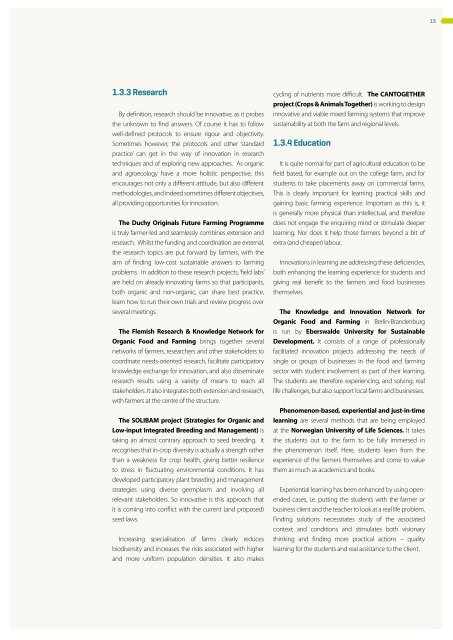tpo_dossier_action-plan-for-innovation-and-learning_201406
tpo_dossier_action-plan-for-innovation-and-learning_201406
tpo_dossier_action-plan-for-innovation-and-learning_201406
You also want an ePaper? Increase the reach of your titles
YUMPU automatically turns print PDFs into web optimized ePapers that Google loves.
131.3.3 ResearchBy definition, research should be innovative, as it probesthe unknown to find answers. Of course it has to followwell-defined protocols to ensure rigour <strong>and</strong> objectivity.Sometimes however, the protocols <strong>and</strong> other ‘st<strong>and</strong>ardpractice’ can get in the way of <strong>innovation</strong> in researchtechniques <strong>and</strong> of exploring new approaches. As organic<strong>and</strong> agroecology have a more holistic perspective, thisencourages not only a different attitude, but also differentmethodologies, <strong>and</strong> indeed sometimes different objectives,all providing opportunities <strong>for</strong> <strong>innovation</strong>.The Duchy Originals Future Farming Programmeis truly farmer-led <strong>and</strong> seamlessly combines extension <strong>and</strong>research. Whilst the funding <strong>and</strong> coordination are external,the research topics are put <strong>for</strong>ward by farmers, with theaim of finding low-cost sustainable answers to farmingproblems. In addition to these research projects, ‘field labs’are held on already-innovating farms so that participants,both organic <strong>and</strong> non-organic, can share best practice,learn how to run their own trials <strong>and</strong> review progress overseveral meetings.The Flemish Research & Knowledge Network <strong>for</strong>Organic Food <strong>and</strong> Farming brings together severalnetworks of farmers, researchers <strong>and</strong> other stakeholders tocoordinate needs-oriented research, facilitate participatoryknowledge exchange <strong>for</strong> <strong>innovation</strong>, <strong>and</strong> also disseminateresearch results using a variety of means to reach allstakeholders. It also integrates both extension <strong>and</strong> research,with farmers at the centre of the structure.The SOLIBAM project (Strategies <strong>for</strong> Organic <strong>and</strong>Low-input Integrated Breeding <strong>and</strong> Management) istaking an almost contrary approach to seed breeding. Itrecognises that in-crop diversity is actually a strength ratherthan a weakness <strong>for</strong> crop health, giving better resilienceto stress in fluctuating environmental conditions. It hasdeveloped participatory <strong>plan</strong>t breeding <strong>and</strong> managementstrategies using diverse germplasm <strong>and</strong> involving allrelevant stakeholders. So innovative is this approach thatit is coming into conflict with the current (<strong>and</strong> proposed)seed laws.Increasing specialisation of farms clearly reducesbiodiversity <strong>and</strong> increases the risks associated with higher<strong>and</strong> more uni<strong>for</strong>m population densities. It also makescycling of nutrients more difficult. The CANTOGETHERproject (Crops & Animals Together) is working to designinnovative <strong>and</strong> viable mixed farming systems that improvesustainability at both the farm <strong>and</strong> regional levels.1.3.4 EducationIt is quite normal <strong>for</strong> part of agricultural education to befield based, <strong>for</strong> example out on the college farm, <strong>and</strong> <strong>for</strong>students to take placements away on commercial farms.This is clearly important <strong>for</strong> <strong>learning</strong> practical skills <strong>and</strong>gaining basic farming experience. Important as this is, itis generally more physical than intellectual, <strong>and</strong> there<strong>for</strong>edoes not engage the enquiring mind or stimulate deeper<strong>learning</strong>. Nor does it help those farmers beyond a bit ofextra (<strong>and</strong> cheaper) labour.Innovations in <strong>learning</strong> are addressing these deficiencies,both enhancing the <strong>learning</strong> experience <strong>for</strong> students <strong>and</strong>giving real benefit to the farmers <strong>and</strong> food businessesthemselves.The Knowledge <strong>and</strong> Innovation Network <strong>for</strong>Organic Food <strong>and</strong> Farming in Berlin-Br<strong>and</strong>enburgis run by Eberswalde University <strong>for</strong> SustainableDevelopment. It consists of a range of professionallyfacilitated <strong>innovation</strong> projects addressing the needs ofsingle or groups of businesses in the food <strong>and</strong> farmingsector with student involvement as part of their <strong>learning</strong>.The students are there<strong>for</strong>e experiencing, <strong>and</strong> solving, reallife challenges, but also support local farms <strong>and</strong> businesses.Phenomenon-based, experiential <strong>and</strong> just-in-time<strong>learning</strong> are several methods that are being employedat the Norwegian University of Life Sciences. It takesthe students out to the farm to be fully immersed inthe phenomenon itself. Here, students learn from theexperience of the farmers themselves <strong>and</strong> come to valuethem as much as academics <strong>and</strong> books.Experiential <strong>learning</strong> has been enhanced by using openendedcases, i.e. putting the students with the farmer orbusiness client <strong>and</strong> the teacher to look at a real life problem.Finding solutions necessitates study of the associatedcontext <strong>and</strong> conditions <strong>and</strong> stimulates both visionarythinking <strong>and</strong> finding more practical <strong>action</strong>s – quality<strong>learning</strong> <strong>for</strong> the students <strong>and</strong> real assistance to the client.


